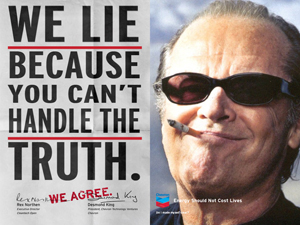
Have you seen the way Big Oil has tried to rebrand itself since the BP oil disaster started six months ago? Each of the major oil companies wants us to believe it is the good oil company, the exception to the rule — not at all like BP. A few months ago, Shell launched its “Let’s Go” campaign, where it touts itself as providing cleaner energy for the next generation. And last week Chevron pulled out all the stops with its multi-million dollar “We Agree” ad campaign.
Chevron’s ads seek to address the current critiques of oil companies with affirming statements like “Oil companies should support the communities they’re part of” and “Oil companies should put their profits to good use.” All the ads feature “real people” saying what they think about oil companies while Chevron employees earnestly state, “We agree.”
Excuse my language, but what a bunch of hogwash. Chevron’s new ad campaign is an appalling display of hubris and greenwashing. It’s also ripe for the hoaxing. And that is exactly what’s happening. Chevron’s “We Agree” ad campaign is so rife with bitter but mock-worthy irony, in fact, that the comedic geniuses at Funny Or Die spoofed it today:
http://player.ordienetworks.com/flash/fodplayer.swf
Update: The “We Agree” spoofing went viral, thanks in part to a website we launched along with The Yes Men and Amazon Watch: ChevronThinksWereStupid.org. Click that link to get in on the Chevron spoofing action and view many more amazing spoof ads!
Chevron’s advertising scheme to win over its critics backfired when it was launched. But the campaign actually started going south from the moment of production.
The oil company initially attempted to hire green bloggers, political street artists and activists for its ad campaign — presumably thinking these folks would somehow forget that the company pulls in around $167 billion a year in revenues by drilling for, refining and selling one of the dirtiest fossil fuel sources around.
Apparently Chevron thought it could throw some money at environmentalists and get them to help clean up the company’s image. Instead, those environmentalists had another idea — they would tip-off some of their close friends and launch Chevron’s campaign for them.
The fun started last week when, as the New York Times put it, “pranksters” lampooned Chevron’s ad campaign. Or, to put it another way, the fun started when the advertising strategy for one of the biggest oil companies in the world was officially punk’d.
Hours before Chevron went live with its $90 million dollar “We Agree” ad campaign, Rainforest Action Network and Amazon Watch partnered with famous corporate pranksters The Yes Men and came out with our own version. We altered Chevron’s “We Agree” ads ever-so-slightly to highlight the company’s greenwashing efforts as well as its role in dumping 18 billion gallons of toxic oil pollution in the Ecuadorean Amazon. For the first few days of the company’s ad launch, our fake press release, ads and website dominated the news and drowned out Chevron’s corporate greenwashing.
Mock chevron ads also started showing up in the streets of San Francisco, Los Angeles and Washington, DC. And a contest was launched to see who could create the best-spoofed Chevron ad. My personal favorite has a sneering picture of Jack Nicholson with the tagline, “We lie because you can’t handle the truth.”
Our intention is not to trick reporters or play a practical joke on Chevron. Our intention is to highlight the egregious distance between Chevron’s rhetoric and reality. A company that wreaks havoc in communities across the globe has a lot of nerve coming out with ads featuring actors saying, “Oil companies should support the communities they’re part of.” It is hubris incarnate.
The question is, did Chevron think these ads would actually be compelling to critics? Do they really think we’re that stupid?
I think the answer may have been, yes. Instead of trying to clean up its mess, the company thought it could run a $90 million dollar ad campaign cleaning up its image.
Message to Chevron: We’re not that stupid.
This post originally appeared on Huffington Post.